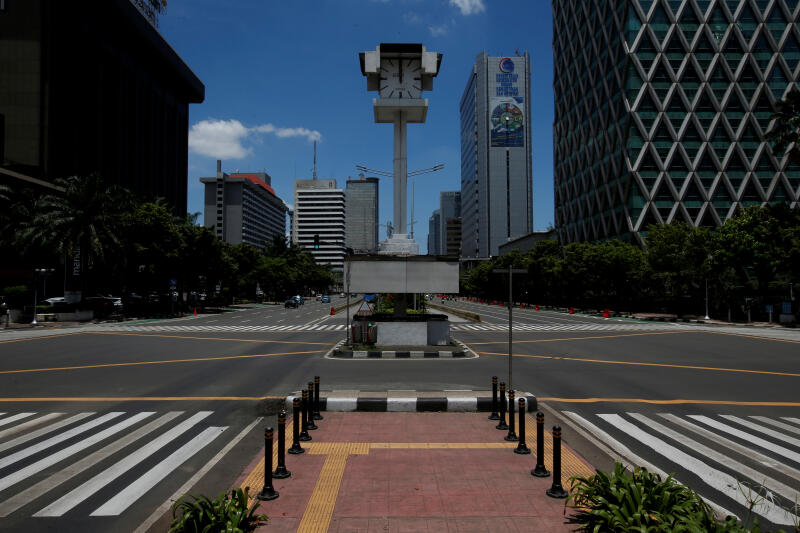Coronavirus: Indonesia bans civil servants from returning to hometowns for Muslim festival
Sign up now: Get insights on Asia's fast-moving developments

Jakarta will start large-scale social distancing measures from April 10, 2020.
PHOTO: REUTERS
Follow topic:
JAKARTA (THE JAKARTA POST/ASIA NEWS NETWORK) - The Indonesian government has prohibited civil servants from participating in the annual Idul Fitri mudik (exodus) to their hometowns, in an effort to curb the spread of Covid-19 in rural areas.
In a circular issued on Monday (April 7), Administrative and Bureaucratic Reform Minister Tjahjo Kumolo said civil servants and their families were prohibited from the mudik until the country "is free of Covid-19".
He also asked the staff development officers of ministries, agencies and regional administrations to ensure that their civil servants stayed in their respective regions and did not participate in the mudik.
Tens of millions of Indonesians from the big cities such as Jakarta board vehicles, ships and planes to return to their hometowns before Idul Fitri or Lebaran, the festival celebrated by Muslims at the end of the fasting month.
Mr Tjahjo said the officers were also asked to formulate a Covid-19 relief policy for civil servants and their families.
"If civil servants have to travel outside of their region, they have to acquire permission from their supervisor," the circular said, adding that civil servants who violated the regulation would be subject to disciplinary sanctions.
There are 4.28 million civil servants across the country, according to 2019 data from the National Civil Service Agency (BKN).
Two weeks ago, Indonesia's Coordinating Maritime Affairs and Investment Minister Luhut Binsar Pandjaitan said the government has decided to allow the exodus to take place, but at the same time appealed to the public not to do it.
"Our main consideration is to prevent the economy from stopping altogether," Mr Luhut told the media on April 4. "After we calculated everything, (having no lockdown) is our best option among a number of flawed options."
Indonesians, nearly 90 per cent of whom are Muslim, will celebrate Idul Fitri in the third week of May.
Two of Indonesia's largest Islamic mass organisations, Nahdlatul Ulama and Muhammadiyah, have also advised people against participating in the mudik amid the coronavirus pandemic.
Mr Tjahjo said civil servants have also been asked to urge their neighbours not to participate in the mudik, or to go out of town during the Covid-19 outbreak period, and to heed the government's appeal to keep a distance in social interactions and adopt a healthy lifestyle.
Many public health experts have advised against the practice, as it risks further transmitting the disease to regions with low healthcare capacity.
Jakarta will from Friday (April 10) start large-scale social distancing measures, with gatherings limited to five people, and ramping up police patrols to enforce public compliance.
The capital city of around 10 million people has so far been the area worst stricken by the coronavirus, with a death toll of 114 and 1,470 infections.
The tough measures for Jakarta include the closure of all schools, most workplaces and public facilities, ranging from sports centres to museums; the shortening of operation hours for all public transport services, including the MRT, commuter rail and buses to 12 hours; and restrictions on social, cultural and religious activities.
But eight sectors providing essential services - including health, food, energy, logistics and finance - will remain in operation.
The measures, most of which were already put in place after the capital declared a state of emergency on March 20, will now be mandatory for Jakarta residents, with penalties for defiance.

